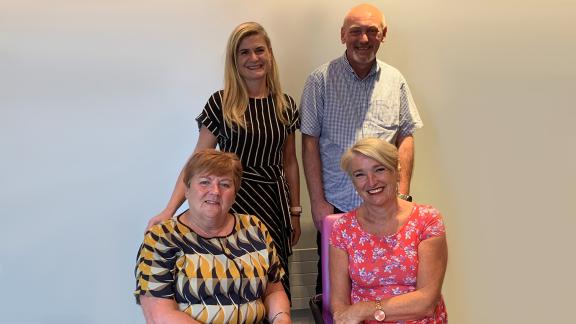Domestic and Sexual Violence and Abuse Toolkit for staff

Overview
Belfast Health and Social Care Trust co-developed a virtual Domestic and Sexual Violence and Abuse Support Toolkit with trade union colleagues. The one stop resource provides support and information on violence and abuse, aims to raise awareness of violence and abuse, and assure staff that it is safe to raise concerns in the workplace.
Background
The trust’s workforce is 84 per cent female, and within wider Northern Ireland society, females experience approximately 69 per cent of domestic abuse. That said, abuse can affect all genders, religions, and classes. The trust’s existing Domestic Violence and Sexual Abuse Support Service for staff revealed the hardships that staff experience. Trade union colleagues shared that several members had sought support with formal disciplinary processes for absences that had resulted from abuse at home. Staff had not previously divulged this sensitive information to their line manager. Often, staff were injured, emotionally stressed, sleep deprived, short of money or temporarily homeless.
Further to this, national statistics revealed an increase in abuse during the COVID-19 pandemic, during which the trust saw a five per cent increase in distress calls to its helpline. Abuse is a workplace issue that can impact a person's ability to attend work, fulfil their job duties and live free from fear and intimidation. In turn, employment can be lifesaving.
Action taken
HR, equality, and trade union leads reviewed the trust’s existing Domestic Violence and Sexual Abuse Support Service and identified several challenges, including early intervention, awareness and removing the stigma, taboos and myths surrounding abuse. They worked with the Police Service of Northern Ireland (PSNI), Women’s Aid, and the Rainbow Project to update the trust’s Domestic Violence and Sexual Abuse Support Service resource and policy with endorsement from the trust’s board and executive team.
As part of the updated approach, the trust:
- made redeployment arrangements with other health and social care organisations
- partnered with external agencies to deliver training for support staff
- tailored their Management of Attendance Training to ensure managers adopt a supportive values-based approach to all absences and are aware of resources available for staff
- established a confidential helpline
- trained former service users as support officers in partnership with PSNI, Women’s Aid, and Victim Support
- created a virtual one stop resource for staff
- committed to ongoing promotion of the support available to staff
- developed a manager checklist: know the signs, absence, injuries, performance, money issues
- launched a podcast highlighting the impact of abuse within a religious, ethnic, cultural and honour context.
The trust also offers salary advances and ten days paid leave to staff experiencing abuse and violence at home, fast-tracks referrals to psychological support services via occupational health, and comprehensive signposting to external services including Women’s Aid.
The trust has just and comprehensive procedures for addressing staff as perpetrators of domestic violence.
The role of partnership working
The trust’s Domestic Violence and Sexual Abuse Service was reviewed and updated in partnership to ensure it is leading edge, accessible and benefits those who access it. Trade union colleagues also encouraged the trust to promote the updated service in everything they did. As a result:
- corporate calendars feature the Domestic Violence and Sexual Abuse Service
- details of the service are included in managers’ induction and new-starters’ on-boarding process
- posters/banners publicising the service are displayed trust-wide
- the chief executive, Joint Health & Safety Committee and Joint Negotiating Forum receive quarterly updates on the service
- the trust runs domestic abuse awareness sessions, which have received positive feedback.
Staff feedback
- “Knowing my manager was there for me and my job was secure, was one less thing to worry about.”
- “Moving to another part of Northern Ireland but still having a job when I got there with a different trust, really helped me and my kids to get away.”
- “The salary advance was essential as I needed rent deposit for our new home. I’m not sure how we could have left otherwise.”
- “Being able to sit down with my union rep and finally let out my big secret really helped me, and they gave me the confidence to tell my manager what was going on at home.”
Sharing learning
Learning and good practice have been shared externally via the NHS Staff Council’s health, safety and wellbeing partnership group, and the service was adapted to form a model policy. See the NHS Employers' website for more information.
The trust shared the policy and resources within Health and Social Care Northern Ireland, permitting them to be adopted/adapted by any health and social care organisation.
The trust has presented at two Legal Island (Northern Ireland Employment Law) conferences and has shared the policy and tools with several private sector employers.
Lessons learnt from the project
- Partnership delivers the strongest results. The interdependencies internally within the trust ie, HR and trade unions have been key to delivering a joined up, person centred service.
- The trust’s external partnerships with experts including PSNI, Women’s Aid, Housing Executive, Legal firms, Men’s Advisory Project enhanced the ability to seamlessly target support to those staff who have requested it, and signpost without delay to organisations.
- The trust is proud that, through NHS Employers, they have helped shape and inform the national agenda.
- Sharing learning has helped other employers to quickly get started and take the project forward within their organisations.
How the project will be sustained going forward
Sustaining the project going forward is a strategic priority for the trust. The trust’s commitment to partnership working is well established in all they do. Supporting staff who experience domestic violence and sexual abuse is another aspect of this and connects the whole person experience for staff. Colleagues do not simply leave their life outside of work at the door, the trust supports staff both inside and outside of work.
The service is highly regarded and endorsed by the executive team. The trust will continue to listen to feedback from users, trade union colleagues and support workers and is committed to quality improvement.
Further information
For more information, contact Samantha Whann, Belfast Health and Social Care Trust.



